It's often said the United States is built upon the backs of its immigrants, and it's true. The American melting pot would not be what it is without our ancestors. Without the Irish immigrants of the past, much of the country's institutions and culture would be sorely lacking today.
Overseas immigrants flooding into major ports and cities made for a predicament. Many came from a rural existence and had to adapt to city life. Impoverished travelers to these hubs of industrialization were forced to arrange living accommodations where they could. This often meant homes were taken up among subdivided houses, small rented spaces, and even in open alleyways.
Similar to many modern immigrants, faith was a crucial dimension of life for those coming to the New World from their native land. Much of the Irish milieu existed within a culture of Catholicism. The biases of anti-Catholicism and anti-immigration made for rough times for the Irish, especially during the 1800s.
Without the Irish, the Chicago River wouldn't turn green each year on March 17, nor is it likely that you would be drinking the verdant-tinged beer at the bar either. (Irish-Americans were celebrating St. Patrick's Day in the States as early as the 18th century.) The sphere of politics shall forever bear the footprints left by leaders of Irish descent found throughout its history.
From homemade cuisine to public festivities that have become a mainstay of society, the Irish have contributed in countless ways to the face of the nation. Here are a few books that take us back through the years, showing the development of Irish-American identity, their struggles and their prosperity.
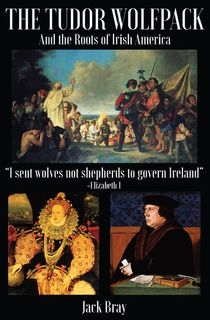
The Tudor Wolfpack
A proud Irish American himself, Jack Bray unravels the story of how centuries of British persecution of the Irish caused waves of Irish migration to America and established the foundation of Irish American culture. Looking further back than the other books on this list, this book gives background on how the Irish American diaspora came to be, starting in the 16th century.
Irish rebellion under British rule caused the Tudor leaders to send harsh “wolves” to govern Ireland, confiscating land and mistreating the local people. This relentless oppression forced many Irish people to flee. Bray follows the line of these emigrants into America as they forged a new path.

The Alamo's Forgotten Defenders
In the legendary story of the Texas Revolution and the Alamo, one aspect is not often remembered. In the 1830s, the Irish were the largest immigrant group in the land of Texas. This military history tells the story of some of the most dedicated voices in the fight for Texan independence: Irish revolutionaries.
Digging deep into long overlooked historical primary sources, Philip Thomas Tucker presents a history of the Irish in the Texas Revolution as well as a wide-reaching exploration of the economic and cultural histories of Irish immigrants in Texas. This book is a vital and missing piece in research and discussion surrounding the Texas Revolution and provides long overdue appreciation of Irish Texans.
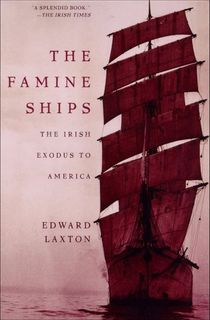
The Famine Ships
The Famine Ships tells the story of the Irish emigrants who sailed to America between 1846 and 1851, a mass exodus caused by the Irish Potato Famine. Edward Laxton conducted extensive research in both Ireland and America, including interviews with the descendants of those who were on board.
This book gives an inside look into a very specific moment in history, the often treacherous journey of the Irish people who were on their way to become Irish Americans. Detailing the terrible conditions on the ships and the strong wills of the immigrants who held great hopes for America, Laxton is able to build a vivid portrait of the people, ships, and towns surrounding this moment in time.
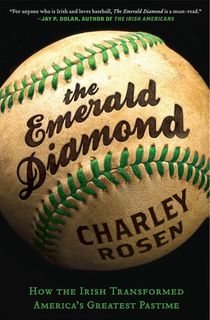
The Emerald Diamond
Irish Americans have played a part in weaving almost every aspect of the fabric of the country, including America’s pastime. The history of baseball is deeply entwined with and affected by the history of the Irish in America, from innovations on the field to the founding of the first players’ union.
The Emerald Diamond tells the story of great Irish players and managers, their impact on the game, and the cultural and political contexts within which they lived and played. New York Times bestselling sportswriter Charley Rosen looks back in history, starting with the early days of the sport, and works up to interviews with current players who are still carrying on the Irish American legacy in baseball to this day.
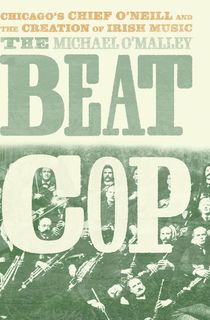
The Beat Cop
Michael O’Malley outlines the true story of an unlikely hero for Irish music, Chicago Police Chief Francis O’Neill. Born and raised in County Cork, Ireland, O’Neill became a Chicago police officer in 1873 and was Chief of Police from 1901-1905. O’Neill was appointed chief three times by two mayors, an extraordinary feat in a time when the city’s political appointments were greatly influenced by corruption and connection.
In addition to being a leader and innovator on the police force, O’Neill had a huge impact on the formation and proliferation of Irish music. O’Neill spent many years collecting Irish tunes he deemed true to tradition, devoting his life to this work after he retired from the force. He published his collections of songs and is widely credited as playing a substantial role in the evolution of traditional Irish music. O’Malley captures this unique and impactful figure who was an involved and influential member of the Irish American community in Chicago.
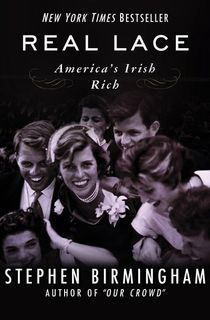
Real Lace
Real Lace traces the story of many notable American family lineages back to Ireland's potato famine, also known as the “Great Hunger,” which spanned about half a decade. The incident led to declining health, resulting in over a million deaths in Ireland. The failed crop prompted numerous families to emigrate from the Emerald Isle in search of greener pastures. Stephen Birmingham, the late historian and bestselling author, follows a few of these Irish-Catholic clans, focusing on their subsequent development in the United States. From their descendants rose prominent figures such as the Silver Kings and President John F. Kennedy.
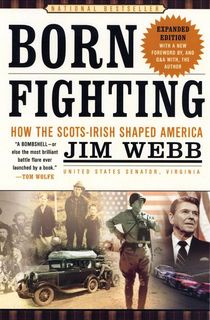
Born Fighting
While Born Fighting isn't perhaps Jim Webb's most renowned book, he nevertheless fleshes it out with the same detail found in any of his other writing. A Marine veteran who has since gotten involved in politics and journalism, Webb examines the line of Scotch Irish (or Scots Irish) heritage and its influence on American military and polity. It isn't a passion project simply because it explores interests related to Webb's professional career, but also because it explores his roots.
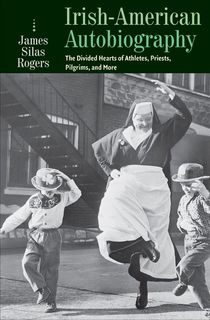
Irish-American Autobiography
What does it mean to be Irish? And what does it mean to be American? The two cultures make for an eclectic and engaging blend, but that doesn't mean it was easy from the get-go. As already noted, these immigrants frequently confronted discrimination and struggled to assimilate to the pre-existing American society. James Silas Rogers—a poet, editor, and scholar familiar with Irish studies—examines how the Irish-American identity developed over time, taking into account factors such as employment, recreation, and faith. Irish-American Autobiography is built up by snippets of memoirs from real individuals. Collectively, they make for a raw and personal history of the Irish American.
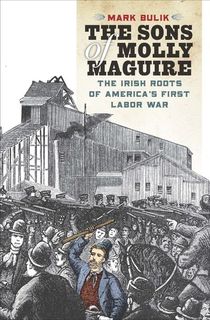
The Sons of Molly Maguire
The Sons of Molly Maguire takes a look at some deep and somewhat dark Irish roots and the origins of the group that came to be known as the “Molly Maguires.” The historical Molly Maguire was a widow dwelling in Ireland in the 19th century. She opposed the position many English landlords held over her countrymen… so, she spearheaded a group that strived to steal lands away from the landlords. Apparently, they were fond of the fighting mantra: “Take that from a son of Molly Maguire!” In the following decades, the “Molly Maguires” began to appear in the US. It has been suggested that the discrimination and economic hardship discovered by immigrants in the states led to drastic measures similar to those witnessed earlier in Ireland. Mark Bulik's book introduces the reader to the engrossing world of the “Mollies”, their influence amid wartime, and how their efforts shaped successive methods of labor activism.

Irish Immigrants in New York City, 1945-1995
New York City and Boston, Massachusetts became big urban centers of immigrant activity in the 19th and 20th century, especially with regards to the incoming Irish. One can easily imagine weary immigrants gazing up at the face of Lady Liberty upon their arrival in New York. Even today, New York City supports a strong Irish element, comprising what is believed to be more than 10% of the city's population. Linda Dowling Almeida's Irish Immigrants in New York City delves into the changing tides contrasting the Irish immigrants of the 1950s with the “New Irish” of the 1980s. It's an important exploration into the evolution of the Irish-American demographic during the 20th century. Almeida, an adjunct professor of history at New York University, has spent much of her studies focusing on Irish-Americans' past.

The Irish in the American Civil War
Damien Shiels, a historian specializing in military and conflict, combines two major aspects of 19th-century American history: the Civil War and the understanding of social belonging. During the U.S. Civil War and its aftermath, people had to deal with division stemming from racism, economic structures, and different ideas of allegiance. For many, there was a line drawn between North and South, between one state and another. National identity was slowly being realized and nurtured. Amid this change, Shiels documents several specific accounts of the Irish who got caught up in the Civil War. Figures such as the disguised female soldier Jennie Hodgers and the “Irish Rifles” member and US marshal James O'Beirne make for just a few of the engrossing stories captured in The Irish in the American Civil War.

The Mob
If the American dream doesn't come to fruition, some resort to violence. Such is the case of the Irish mob, a network of crime that sprung up in urban society. A historian and Irish-born writer himself, James Durney attempts to capture some of the most desolate and destructive moments in Irish-American heritage in his book The Mob. From well-known incidents such as the St. Valentine's Day Massacre to less familiar events like the “Irish War” in Boston, Durney strives for a drama in realism.

Ulster to America
The roots of the Scotch-Irish family tree go back to the Ulster plantation in Northern Ireland that was established in the 1600s under England's colonization. At Ulster, many of the newly arrived settlers were Scottish. Some years down the road, the Ulster Scotch-Irish found themselves under pressure from both the native Catholics and the Anglicans. Hence, a migration from Ulster to the states took place, its beginnings predating the mass exodus witnessed during Ireland's potato famine. Like so many early American settlers, the Scots-Irish hoped for religious liberty and a little breathing room. Ulster to America, a detailed volume compiled and edited by Warren Hofstra, hosts groundbreaking contributions from a number of scholars.
This post is sponsored by Open Road Media. Thank you for supporting our partners, who make it possible for The Archive to continue publishing the history stories you love.




